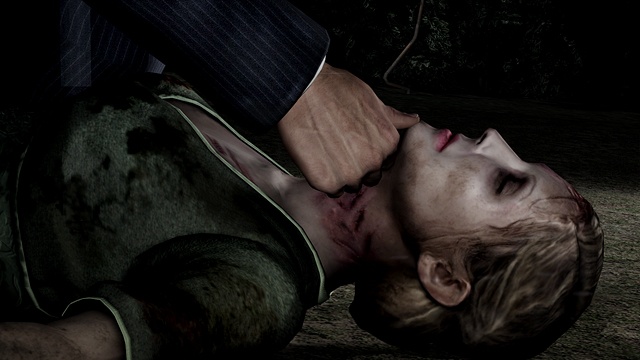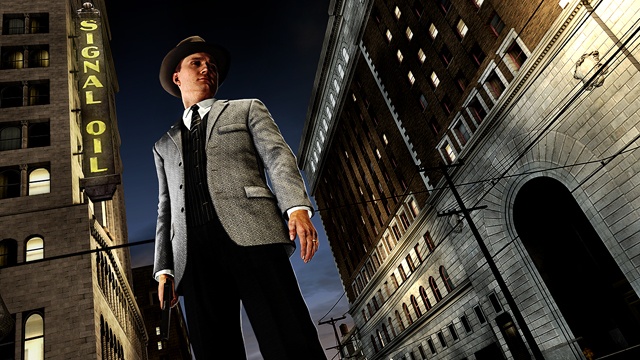Twitter Takeover: L.A. Noire
Rockstar answers your questions about its upcoming crime-solving game.
If you follow the official GameSpot Twitter account, you'll know that we recently put out an open call to have your questions about L.A. Noire answered directly by Rockstar Games. It's a fun new experiment we're trying out as a way to directly connect you--our GameSpot readers--to the developers you care so much about. After all, modern social media isn't all about awkward tags and pokes--it can be used for good, too! So here they are--a handful of answers to your questions straight from Rockstar VP of product development Jeronimo Barrera.
@AEGRO asks: How long has L.A. Noire been in the making? And how difficult was it to hire or contact the A-list actors that work in the game? Thanks!
Jeronimo Barrera: L.A. Noire has been in development for over five years, and the game evolved over that time in parallel with the MotionScan technology used to capture the actor’s performances. Fortunately, Team Bondi worked with an excellent casting agency in order to find the perfect actors for each part in the game, and actors like Aaron Staton, Michael McGrady, and John Noble leapt at the chance to feature in a game that had such a strong story and such a reliance on great acting, alongside the technology to allow those actors to really showcase their talents.
@nickmichetti asks: Is there a tutorial in L.A. Noire to teach gamers how to interrogate? Can you give any details about what it contains?
JB: Yes, you start out on patrol, as a beat cop, learning the tools of good police work, including how to properly investigate a crime scene and how to successfully interrogate a witness or suspect. These early cases will teach you what to look for in each suspect and how to use your notebook to cross-reference your evidence with the statements made by suspects in order to catch them out.
@breathofj asks: Do the detective cases intertwine with each other for a main arc or are they mostly separate, sandbox-style cases?
JB: The main story arc of L.A. Noire is based around the story of Cole Phelps, a young and ambitious policeman trying to wash away the traumatic memories of his time as an officer during World War II by solving crimes for the LAPD. Cases are grouped by desk, from patrol, through traffic, homicide, vice, and arson, with each focusing on a type of crime. While each case has a clear beginning and end, Cole’s story will unfold as you move from desk to desk and case to case, revealing more about both Cole and the criminal underbelly of Los Angeles as you climb the ranks.
@Ljud89 asks: Are there dialogue options only in interrogations?
JB: Conversation-based gameplay takes place any time you’re actively working to get information on a case, so you’ll have dialogue options when interrogating suspects and also while questioning witnesses. This makes each interrogation a battle of wits, as if you were interrogating a real person. Outside of this aspect of gameplay, you can also ask your partner for tips on how to proceed if you’re stuck on a specific aspect of a case.

@TheDankestMofo asks: With Cole Phelps' law-abiding occupation, how will the free-roam mechanic compare to GTA and RDR?
JB: L.A. Noire is designed very differently, not only from Grand Theft Auto but also from any other game. It's built around the concept of cases, and each case is a self-contained unit, like an episode of a cop show. The game is designed to be a crime thriller, really making you feel like you're a detective pursuing and solving cases. So you don’t begin cases from a mission marker on a map like GTA or RDR; you begin inside each case or by accessing it from the "Cases" menu.
So while there isn't "free roam" in the game along the lines of those games, the world is open to traverse from location to location. And, there are some hidden items scattered around the world to find and collect on the way, including classic film reels, landmarks, and rare vehicles. You’ll have to use your investigative skills, though. Finding everything will yield XPs to unlock intuition points and unlock an achievement/trophy, and progress will be trackable at the Rockstar Games Social Club.
You will also be able to tackle unassigned street crime cases around the city. These will come in over your radio while you’re on a major case or will be discoverable as you travel. These include things like chasing down a purse snatcher, thwarting a robbery in progress, talking a suicide jumper safely off a ledge, and lots more. That said, free-form anarchy is not something a good detective is rewarded for--running over a pedestrian while on a case or causing public damage or harm will lower your end-of-case rating. And, a detective who pulled out his weapon any time other than in the line of duty would not be on the force for long.
Got a news tip or want to contact us directly? Email news@gamespot.com

Join the conversation